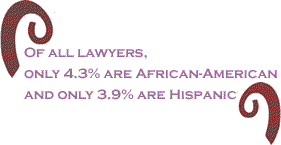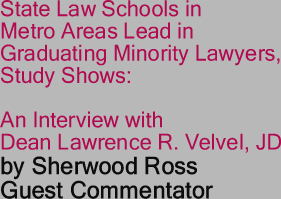| |
|
|

State-supported universities in metropolitan
areas that charge comparatively modest tuition "are playing an invaluable if
unsung role in preparing minorities to enter the legal profession," a
noted legal educator said today. "We need more efforts like
theirs because law school tuition at private universities is skyrocketing."
But Dean Lawrence Velvel of the Massachusetts School of Law at
Andover added, "The
gap remains very great and minorities and working-class whites have got a
long way to go before they are fairly represented in the legal profession
commensurate with their populations." Of all lawyers, only 4.3% are
African-American and only 3.9% are Hispanic.
Commenting on a study of current tuition fees at 189 law schools in the
U.S. and Puerto Rico, and their African-American and Hispanic enrollments,
Velvel
said, "It is apparent most private law schools have literally priced
students from working class backgrounds off the campus. Law school walls
may be covered with ivy but the green pickings that really count are reserved
largely for affluent white kids from suburbia."
The study, made for MSL by media consultants Ross Associates of Miami, Fla.,
is based on figures contained in the 2007 edition of the Law School Admission
Council and the American Bar Association(ABA). The ABA-LSAC report includes
tuition charged by each law school and other information, including the percentages
of minority students enrolled in each school.
Velvel said some private law school tuitions’ have soared to nearly
$40,000 a year and students who do graduate "often find themselves with
debts that will take them years to repay, discouraging many from working
as legal defenders for the poor."
He pointed out that at the University of Miami, Coral Gables, Fla., where
the annual tuition is $31,094 a year, only 11.8% of the student body is Hispanic,
but at nearby Florida International University (FIU), where tuition is $8,543,
Hispanic enrollment is 40.7%. The Miami area Hispanic population is above
50%.
At private Vanderbilt University School of Law in Nashville, where the tuition
is $34,036, only 9.9% of the student body is African-American. By contrast,
at the University of Tennessee in Knoxville, where tuition is $9,412, 12.9%
of the student body is African-American and at the University of Memphis,
where tuition is $9,352, 13.5% of the student body is African-American.

Velvel said that 46 of the 189 ABA-accredited law schools charge an
annual tuition of $30,000 or more, the costliest being Columbia University
of New York City, which charges $39,172 and has an African-American enrollment
of 8.6% and an Hispanic enrollment of 1.6%. "Paying such tuition is
beyond the dreams of most middle-class families, much less minority and
working-class families."
As for the 90 law schools charging a tuition of $25,000
or more, nearly half of all the law schools in America, "only two of them, Duke and Harvard,
have as many as 10% African-American students. "Efforts by private colleges
to attract minorities are being undercut by their own high tuition," Velvel
added. Law school costs are soaring due to needless ABA requirements "to
provide a luxurious environment for law school professors," he asserted.
Velvel also faulted State Supreme courts that do not allow educational
bodies other than the ABA to accredit law schools, eliminating competition
in this
area.
"Acting as a veritable guild for law school professors, the ABA frowns on
the practice of hiring qualified, part-time lawyers to teach, and attempts to
dictate expensive, if not luxurious accommodations for their members," Velvel
said. "This pushes up costs and, therefore, tuition." Velvel noted
ABA signed a consent decree with the Justice Department a decade ago to stop
anti-trust violations but "continues many cost increasing practices to
the consternation of law school deans around the nation."

Velvel said if there was an honor roll for law schools charging
tuition of under $11,000 that opened the doors to minorities,
besides FIU and the University
of Memphis, it would include:
-
Florida A&M, Orlando,
$7,242, 41% African-American
Tuitions charged by the 10 costliest law schools in America,
and their percentages of African-American and Hispanic students,
follow:
(1) Columbia, $39,172, 8.6 and 1.6
(2) Yale, $38,800, 8.9 and 6.1
(3) New York Law School, $38,600, 6.0 and 5.1
(4) Northwestern, $38,372, 6.0 and 5.l
(5) NYU, $38,255; 6.9 and 6.9
(6) USC, $37,971, 9.1 and 2.4
(7) Cornell, $37,812, 7.7 and 1.9
(8) University of Pennsylvania, Philadelphia, $37,086, 7.9
and 4.8
(9)Duke, $36,574, 10.6 and 3.9
(10) University of Chicago, $36,138, 7.5 and 6.3
Velvel cofounded MSL in 1988
and has been dean since its inception. 85% of its graduates pass
their State bar
exams, and MSL is accredited by The New England Association of
Schools & Colleges. It charges a tuition of $13,300 and was
hailed in a Wall Street Journal article as "The Little Law
School That Could." Dean Velvel was described in last October’s "The
National Jurist" magazine as "one of the most influential
people in legal education over the past 15 years." He has
been honored by the National Law Journal for his long-term efforts
to provide a level playing field in law school admissions for working-class
and minority students.
Sherwood Ross is an American reporter who has worked for
major American newspapers and magazines as well as international
wire services. To comment on this article or arrange for speaking
engagements: [email protected].
His blog is The
Smirking Chimp. Click here to
reach Dean Velvel.
|
|
| Home |
|
|
|

Your comments are always welcome.


If you send us an e-Mail message
we may publish all or part of it, unless you tell us it
is not for publication. You may also request that we withhold
your name.
Thank you very much for your readership.
|
|
|







































